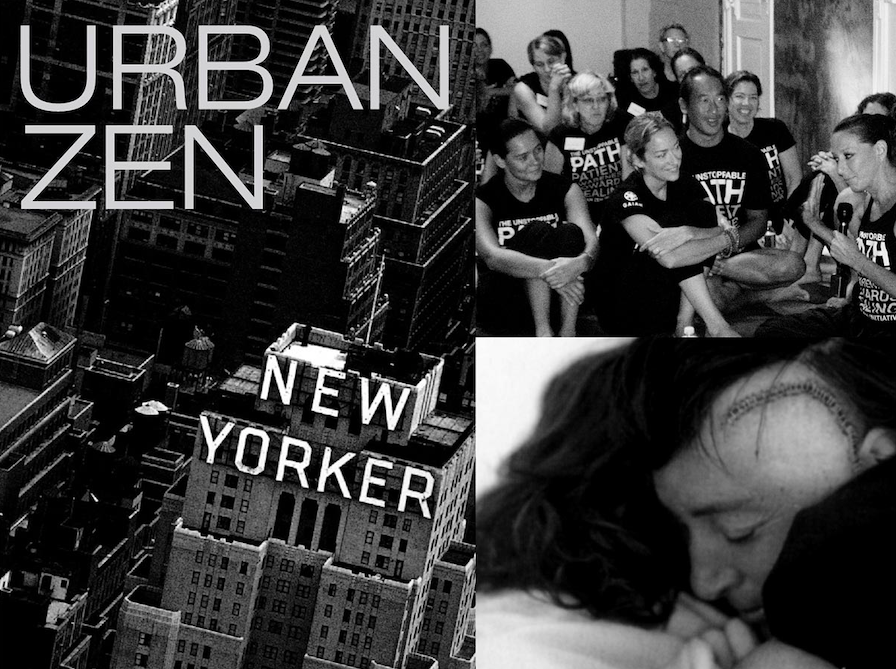
Well+Being Holistic Mental Health
Emotional Health & Wellness Tips From The Therapy Couch And Other Places

Nurse, Heal Thyself
(by Kim Seelbrede, originally posted on urbanzen.org)
The Healing Power of Self-Care for Nurses: A Reflection on Urban Zen Integrative Therapy at the NSNA Convention
As delicate snowflakes danced across the Utah sky, a sea of passionate and ambitious nursing students gathered in Salt Lake City for the 59th Annual National Student Nurses Association (NSNA) Convention. Beneath the buzz of clinical discussion and future-focused enthusiasm, a quieter and more essential invitation was extended to these frontline caregivers: to pause, to receive, and to restore.
In a serene space known as The Sanctuary—generously provided by Johnson & Johnson as part of their Campaign for Nursing’s Future—student nurses were welcomed into the calming embrace of Urban Zen Integrative Therapy (UZIT). It was here that many of them experienced, for the very first time, the profound impact of receiving care instead of providing it.
Nurses, Self-Neglect, and the Culture of Overgiving
The nursing profession is one of devotion, long hours, emotional labor, and unrelenting resilience. Nurses are celebrated as compassionate givers—but rarely taught the parallel art of receiving. In fact, many nurses internalize the idea that self-care is indulgent, or worse, selfish. As burnout and compassion fatigue become chronic conditions within the field, a new conversation must emerge: How do we care for the caretakers?
What many nurses are not taught in school—but urgently need—is the practical, embodied experience of self-care. Not a buzzword, not a spa day, but a deep nervous system reset. A return to being rather than constant doing. This is the heart of the Urban Zen Integrative Therapy model.
Creating a Healing Environment for Healing Professionals
Inside The Sanctuary, student nurses were guided through gentle restorative yoga poses, supported by skilled Urban Zen Integrative Therapists offering Reiki, essential oil therapy, and mindful breath awareness techniques. The results were immediate, visible, and profound. Stressed shoulders softened. Eyes welled with tears of release. Breathing slowed. Presence returned.
As one nurse quietly shared, “You’ve inspired me to take time for myself—to breathe and rest. I didn’t know how to do this.” Another student confided, “I feel blessed to have met you today. I’m finally able to be ‘in’ my body.”
These reflections speak to a deep and unmet need in the nursing profession: the need to feel safe enough to slow down and reconnect with the body. The need to be more than a set of hands. To feel held, witnessed, and restored.
Why Nurses Need More Than a Reminder—They Need a Roadmap
Nurses are often told to care for themselves, yet few are taught how. The Urban Zen Foundation responds to this gap with a practical and nourishing self-care curriculum that blends Eastern healing traditions with Western science—designed by healthcare professionals, for healthcare professionals. This model includes:
Breathwork to regulate the nervous system
Restorative movement to release tension
Aromatherapy to shift emotional states and stimulate the limbic system
Reiki to restore energetic balance
Mindfulness practices to create calm and improve focus
These are not just self-care techniques. They are professional survival tools. When nurses are given permission and guidance to nourish themselves, they show up more fully—not only for patients but for their own lives.
Reclaiming Wholeness in a Fragmented System
The burnout crisis in healthcare is not simply about long hours and heavy caseloads—it’s about disconnection. Nurses have been trained to override their own needs for the sake of others. This disconnection from the self is unsustainable. Without intentional practices of reconnection, even the most skilled and passionate caregivers will feel depleted.
Our time in Salt Lake City was a call to action. As healthcare professionals and advocates, we must do more than remind nurses to take care of themselves—we must equip them with the knowledge, experiences, and embodied tools to make that care accessible and sustainable.

Urban Zen Center: Dr. Mark Hyman Speaks On Diabesity
(by Kim Seelbrede, originally posted on urbanzen.org, Nov 10, 2010)
Mark Hyman, MD Returns to Urban Zen: A Functional Medicine Approach to Reversing Diabesity and Chronic Disease
The Urban Zen Center was honored to welcome back Mark Hyman, MD, a visionary leader in functional medicinewho lovingly refers to Urban Zen as his "second home." On October 30, 2010, a packed studio gathered in the heart of New York City’s West Village for a full-day workshop on one of the most urgent health crises of our time: Diabesity—a metabolic epidemic at the intersection of obesity, insulin resistance, and type 2 diabetes.
Dr. Hyman, a best-selling author and founder of The UltraWellness Center, delivered a compelling, science-backed message: chronic disease is not inevitable—and it is often reversible through lifestyle and systems-based medicine.
Understanding Diabesity: A National Health Crisis
“Diabesity” is the term Dr. Hyman uses to describe a spectrum of metabolic dysfunction that ranges from mild blood sugar imbalances to full-blown type 2 diabetes. And the numbers are staggering:
Nearly 3 out of 4 Americans are classified as overweight or obese.
1 in 3 military volunteers is considered unfit for service due to obesity.
Children today may be the first generation not expected to outlive their parents.
This epidemic isn’t just a public health concern—it’s been labeled a national security threat by military leaders.
Dr. Hyman challenged us to rethink what we’ve been told about health and disease. The problem, he explained, is not genetic fate or bad luck—it’s the failure of conventional medicine to address the root causes of chronic disease. Instead of masking symptoms, we must treat the whole system. That’s where functional medicine steps in.
Functional Medicine: Treating Root Causes, Not Just Symptoms
Throughout the day, Dr. Hyman introduced key concepts that underpin his functional medicine approach, including:
Epigenetics & Nutrigenomics: We may carry genes for disease, but lifestyle choices can influence whether those genes are expressed. By addressing nutrient intake, inflammation, and cellular stress, we can “turn down” harmful genes and “turn up” healing ones.

Urban Zen Center: How To Avoid The Epidemic Of Obesity And Diabetes
(by Kim Seelbrede, originally posted on Martha Stewart’s wholelivingdaily/wholeliving.org ) Obesity and Diabetes: How to Avoid the Epidemic
Functional Medicine Pioneer Dr. Mark Hyman Speaks at Urban Zen on “Diabesity,” Inflammation, and the Future of Chronic Disease
Last week in the heart of the West Village, the Urban Zen Foundation hosted an inspiring afternoon with functional medicine trailblazer Mark Hyman, MD, who returned to New York to shed light on a fast-growing public health crisis: the epidemic of obesity, insulin resistance, and type 2 diabetes.
Dr. Hyman calls it "Diabesity"—a term he coined to describe the interconnected epidemic of obesity and diabetes that is now affecting nearly 3 out of 4 Americans. His message? Chronic illness is not our destiny. It is, in many cases, reversible—if we stop treating symptoms and begin healing systems.
The Scary Truth: What We’re Really Up Against
By 2050, one in three Americans will be diagnosed with diabetes. But the warning signs begin decades earlier: blood sugar imbalances, high triglycerides, hypertension, insulin resistance, and abnormal cholesterol levels. Left untreated, these symptoms form the foundation of a larger, metabolic breakdown that can lead to:
In a moment that visibly quieted the room, Dr. Hyman warned, “Our children may be the first generation who will not outlive their parents.” The answer, he says, lies in functional medicine—a systems-based approach to healthcare that treats root causes, not just symptoms.
Functional Medicine 101: From Dysfunctional To Functional
When a participant asked about genetic predisposition, Dr. Hyman explained that genes are not destiny. Through lifestyle changes, we can influence gene expression in ways that promote vitality and resilience. This cutting-edge field—known as nutrigenomics—studies how food and lifestyle choices impact our DNA and mitochondria, the tiny powerhouses in each cell responsible for energy production.

Conquering Food Addictions With Dr. Neal Bernard
On a crisp autumn day in the West Village, the Urban Zen Center hosted acclaimed physician and nutrition researcher Dr. Neal Barnard, founder of the Physicians Committee for Responsible Medicine. The focus of the event? Winning weight battles, curbing food cravings, and reversing chronic disease through the power of a plant-based diet.
Titled “Winning Weight Battles and Conquering Cravings,” the six-hour workshop offered guests a rich blend of nutrition science, practical strategies, and mouthwatering vegan food demonstrations—all centered on addressing the epidemic of food addiction and the growing burden of lifestyle-related disease in America.
Food Addiction And The Brain: The Science Behind The Cravings
Dr. Barnard explained that common comfort foods—especially cheese, chocolate, meat, and sugar—can trigger addictive responses in the brain. These foods stimulate the release of dopamine, the brain’s “feel-good” neurotransmitter, through mechanisms similar to those seen in substance addiction.
When we consume these foods regularly, the brain learns to associate them with reward and pleasure, making it difficult to resist cravings. This neurological loop can lead to overeating, weight gain, insulin resistance, and increased risk for chronic conditions like diabetes, heart disease, and even depression.
According to Dr. Barnard, the food industry, backed by government subsidies and aggressive marketing, capitalizes on this natural craving response—creating a cycle that’s hard to break without intentional dietary change.

